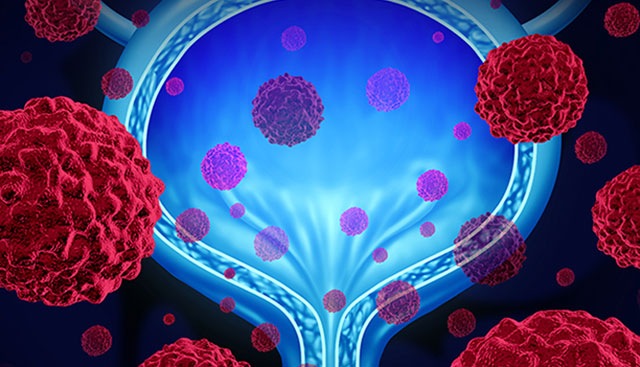
Bladder Cancer Treatment Advancement Roundup
At the recent ASCO 2022, there was a lot of excitement about the novel immunotherapy treatment advancements in genitourinary oncology. Specifically, there are three studies with a focus on upper tract urothelial carcinoma, muscle-invasive, and non-muscle-invasive bladder cancer that are worth noting.
Novel Use of ctDNA to Identify Muscle-Invasive and Non-Organ-Confined Upper Tract Urothelial Carcinoma
Our Genitourinary Oncology Department at Moffitt Cancer Center conducted a study using circulating tumor DNA to refine staging for high-risk upper tract urothelial carcinoma. Moffitt researchers Dr. Roger Li, and Dr. Heather Huelster are leading the trial evaluating whether the presence of plasma ctDNA, as detected by a targeted next-generation sequencing panel, can accurately predict muscle-invasive (>/= pT2) and non-organ confined (pN+) disease.
Neoadjuvant chemotherapy administration in these advanced-stage patients has been shown in many series and a recent meta-analysis to confer both progression-free and overall survival benefits. However, currently available methods of clinical staging are notoriously inaccurate, making it very challenging to identify appropriate candidates for chemotherapy prior to nephrectomy. Thus, ctDNA has the potential to identify patients who may benefit from lifesaving neoadjuvant chemotherapy, particularly in the subset of patients who become ineligible for cisplatin-based chemotherapy related to a decline in renal function after nephroureterectomy.
Neoadjuvant Therapy Proves Effective in Muscle Invasive Bladder Cancer
Intravesical BCG has remained the standard of care for patients with high-risk non-muscle-invasive bladder cancer (NMIBC). However, there are limited options for patients following cancer recurrence after BCG. While bladder removal surgery is the gold standard treatment for BCG unresponsive NMIBC, the trial’s aim is to find an alternative option to help patients keep their bladders while preventing cancers from coming back. It combines immune checkpoint inhibitors with an oncolytic virus, CG0070, that is genetically engineered to attack cancer cells. The solution containing the virus is infused into the bladder to ignite an immune response, and that response is in turn amplified by the immunotherapy treatment that releases the natural brakes on the immune system.
"The oncolytic virus is thought to work through a two-pronged attack. First by targeting and destroying the cancer cells, and secondly, to stimulate an anti-tumor immune response," said Dr. Roger Li, a genitourinary surgeon at Moffitt Cancer Center and the CORE1 trial’s principal investigator. "We're seeing very promising preliminary results in the first 24 patients enrolled in the study. All but two had a complete response that was seen at their three-month cystoscopy."
CORE1: Phase 2, single-arm study of CG0070 combined with pembrolizumab in patients with non-muscle-invasive bladder cancer (NMIBC) unresponsive to bacillus Calmette-Guerin (BCG)
Treatment of recurrent non-muscle-invasive bladder cancer (NMIBC) after intravesical BCG remains challenging. Although the standard of care is radical cystectomy, many patients are unsuitable for surgery due to their advanced age and/or frailty, or simply refuse to undergo the procedure. The development of bladder sparing agents in this disease space has been hampered by the heterogeneity in the patient population, poor definition of disease states, a lack of appropriate control arms, and consensus on trial endpoints.
A Phase 2, Single-Arm Study of CG0070 Combined with Pembrolizumab in Patients with Non-Muscle Invasive Bladder Cancer (NMIBC) Unresponsive to Bacillus Calmette-Guerin (BCG) aims to evaluate the activity of intravesical administration of CG0070 and intravenous administration of Pembrolizumab in patients with tissue pathology-confirmed non-muscular invasive bladder cancer (NMIBC) who have Bacillus-Calmette-Guerin (BCG) unresponsive disease with carcinoma in situ (CIS) with or without Ta/T1 papillary disease (MCC 20711). To qualify, patients must have undergone adequate BCG and then recur with the high-grade papillary disease within 6 months or CIS within 12 months of their last BCG infusion. Adequate BCG, in turn, is defined as having at least 5/6 courses of induction + 2 installations as either maintenance or re-induction.
If you’d like to refer a patient to Moffitt, complete our online form or contact a physician liaison for assistance. As part of our efforts to shorten referral times as much as possible, online referrals are typically responded to within 24 - 48 hours.
